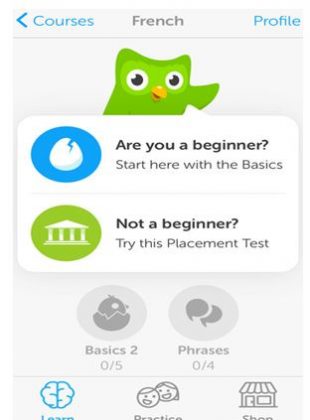

And not in normal, plausible contexts - not “I’ll have an apple, please,” or “Do you want my apple?” The circumstances in which Duolingo envisioned my needing to speak about apples were either too fanciful (“The bird is eating an apple: L’oiseau mange la pomme”) or vaguely threatening (“My pocket contains an apple: Ma poche contient une pomme.” I translated apple from English to French and back again. I cannot even begin to tell you how many times Duolingo had me talking about apples.

Here is what I remember from my months of Duolingo French studies: “une pomme.” An apple.

Do you know why? Because they are real things people say, unlike most of the phrases I recall being taught via Duolingo. When I went on a class trip to China in college, I learned these three phrases, plus “hello” and “thank you,” and I remember them all today, 14 years later. I hoped to learn how to say “Where is the bathroom?” or “How much does this cost?” or “I want that one,” the sort of purely transactional but useful phrases a tourist needs to get around town at least somewhat politely. But I did expect to learn something - anything - useful. A few years ago, about six months before a trip (my first) to Paris, I downloaded Duolingo in an attempt to “learn French.” I put that in quotation marks because I did not, of course, expect to become fluent or even mildly conversant in a foreign language over such a short time frame, and especially not using an app.


 0 kommentar(er)
0 kommentar(er)
